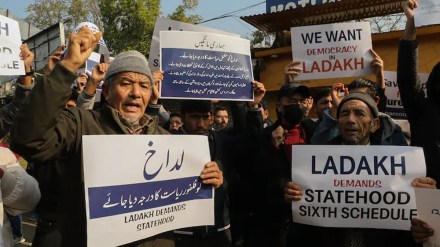Following the protests across Ladakh over demands of statehood, the Centre is mulling granting Article 371-like protection to the Union Territory.
During a meeting of the representatives of Ladakh — Leh Apex Body and Kargil Democratic Alliance — with Union Home Minister Amit Shah on Monday, the minister told them that all their concerns about land, jobs and culture would be addressed through special provisions under Article 371 of the Constitution, sources told The Indian Express.
According to IE sources, Shah made it clear that it would not be possible for the government to accommodate the region’s demand to be included in the Sixth Schedule of the Constitution. The Centre is also learnt to have turned down the request for a legislature. Unlike J&K, Ladakh is a UT without a legislature.
Also Read: Interview l ‘Centre has plenty of resources, and states need more,’ says K M Chandrasekhar
“The minister was sympathetic to the concerns of the people on land, jobs and culture and said these can be addressed through special provisions under Article 371. He said the government was willing to reserve up to 80 per cent of the jobs in the region for local people,” a Ladakh leader, who was part of the discussions, said.
What is Article 371?
Article 371 of the Constitution includes special provisions for 11 states, including six of the Northeast. The Sixth Schedule of Constitution under Article 244 has provisions for the formation of autonomous administrative divisions within a state, with certain legislative, judicial and administrative autonomy.
What are the protests about?
In recent times, Ladakh has witnessed protests demanding statehood, a legislative body, and inclusion in the Sixth Schedule. Concerns about environmental degradation stemming from potential industrialization have also been raised. According to a local leader, “The current administration lacks public involvement, leading to excessive bureaucracy. The region’s key demand is representation through a legislature, but there has been no clear commitment from the Central government on this matter.”
“Ladakh’s rich history, strategic importance, environmental significance, similarity with other states in the North East are the compelling reasons for which Ladakh deserves to be granted statehood,” a memorandum submitted by Ladakh representative bodies to the Union Home Ministry last year said.
Also Read: ‘Dead’ Article 370 is Finally ‘Buried’
Locals fear that with Article 370 now scrapped, outsiders will buy land and compete for jobs that were previously reserved for Ladakh residents.
Ladakh, which has more than 97 per cent tribal population, has sought protection under the sixth schedule of the Constitution. Political outfits in the UT have cited precedents of states like Mizoram, Sikkim and other northeastern states in seeking tribal status.
In simple terms, the sixth schedule entails safeguarding the rights of the tribal population and their cultural identity. Under it, tribal areas are administered as autonomous districts by elected autonomous district councils. Thus, to a certain degree, these areas have legislative, financial and judicial autonomy.
A government-appointed committee is already looking into these demands from the region. “The government was inclined to provide protection for culture, language, land and jobs for Ladakh but not in the way that representatives seek,” sources in the ministry told The Indian Express.
